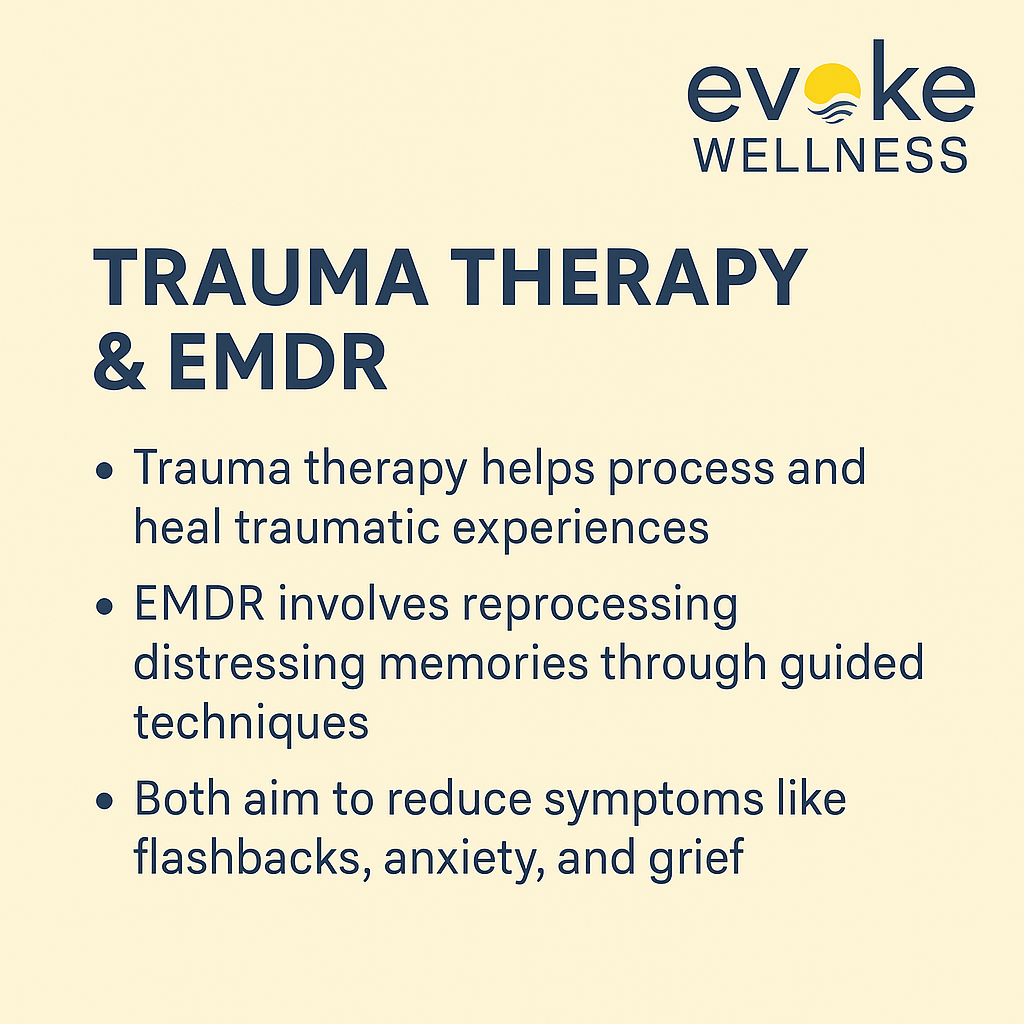When you’ve lived through trauma—especially the kind that hides in plain sight for years—deciding how to heal can feel like its own kind of overwhelming. At Evoke Wellness San Marcos, we know that every trauma story is different. Some wounds are sharp and sudden. Others build quietly over time. So your path to healing should feel just as personal.
One of the most common questions we hear is this: Should I try traditional trauma therapy or EMDR?
Let’s walk through what each option involves, who it helps, and how to know what might fit best for you.
1. What Is Trauma Therapy?
Trauma therapy is an umbrella term for a range of evidence-based therapies designed to help individuals process and recover from traumatic experiences. Rather than focusing only on the event itself, trauma therapy helps you understand how the experience has shaped your thoughts, emotions, behaviors, and sense of safety in the world.
Common modalities under trauma therapy include:
- Cognitive Behavioral Therapy (CBT): Identifies and shifts unhelpful thought patterns
- Internal Family Systems (IFS): Helps you connect with and heal different parts of yourself
- Somatic Therapy: Explores the body’s response to trauma, helping release stored tension
- Narrative Therapy: Supports rewriting the story of what happened with empowerment
Sessions are collaborative, paced according to your readiness, and shaped around building trust. For those with developmental or complex trauma, this foundation of trust is often where healing begins. If you’re seeking this kind of care, Trauma Therapy in Texas offers a range of qualified providers and specialized programs focused on helping you safely process and move forward.
2. What Is EMDR?
EMDR (Eye Movement Desensitization and Reprocessing) is a structured therapy originally developed for PTSD but now widely used for various trauma types. It helps the brain reprocess distressing memories so that they lose their emotional charge.
The core of EMDR involves bilateral stimulation (usually side-to-side eye movements or tapping) while recalling traumatic memories. This process allows the brain to “re-file” the experience in a more adaptive way, often leading to significant symptom relief without detailed verbal narration.
If you’re considering an EMDR Therapy Program in Texas, it’s helpful to know that EMDR is:
- Highly structured
- Time-limited (often 6–12 sessions)
- Less reliant on talk therapy
- Backed by extensive research for trauma recovery
For some, EMDR feels like a fast-track to relief—especially if they’ve already done some therapeutic work and are seeking resolution around specific memories or symptoms.
3. Which Works Faster?
EMDR can produce results more quickly than traditional talk therapy when the goal is to reduce emotional reactivity to specific traumatic memories. People often notice changes within a few sessions.
However, speed doesn’t always equal readiness. Trauma therapy may be better suited for those needing time to establish safety, understand their patterns, or address trauma that isn’t rooted in a single incident.
If your trauma feels like it’s woven into your identity or daily functioning, a slower, more integrative approach might feel safer and more sustainable. There’s no “one size fits all.” Healing unfolds at the pace your nervous system can tolerate.
4. How Do You Know Which One Is Right?
Here’s a simple side-by-side comparison to help you explore your options:
| Feature | Trauma Therapy | EMDR |
|---|---|---|
| Focus | Understanding and healing trauma over time | Reprocessing specific traumatic memories |
| Pacing | Flexible, co-created with your therapist | Structured, can feel intense at times |
| Verbal Processing | Often involves talking through experiences | Minimal verbal narration required |
| Best For | Complex trauma, relational wounds | Specific incidents, flashbacks, performance blocks |
| Session Style | Talk therapy + mind-body tools | Guided recall + bilateral stimulation |
The truth? Many clients use both at different stages. Sometimes we start with trauma therapy to build a foundation, then shift into EMDR for targeted memory work. Others begin with EMDR and transition into therapy to support the integration of what they’ve processed.
5. What If You’re Still Not Sure?
It’s okay not to have all the answers. In fact, not knowing is part of how you know you’re ready to explore. The pressure to “choose the perfect method” can sometimes get in the way of what matters most: starting somewhere.
At Evoke Wellness San Marcos, we don’t believe in rigid treatment tracks. Instead, we collaborate with you to co-create a plan that fits your nervous system, your story, and your goals. Healing isn’t linear. It’s layered, and it can change as you grow.
Whether you’re carrying the weight of childhood trauma, a sudden event that upended your life, or a confusing mix of both—there’s a path forward. And you don’t have to walk it alone.
FAQs: Trauma Therapy vs EMDR
Is EMDR safe for childhood trauma?
Yes, but only when you’re emotionally ready. For those with complex or developmental trauma, EMDR should be introduced gradually, often after establishing a sense of safety through traditional therapy.
Can I do both EMDR and trauma therapy?
Absolutely. Many people benefit from using both methods at different times in their healing journey. Therapists at Evoke can help determine the best sequencing for you.
Does EMDR erase memories?
No. EMDR helps reduce the emotional intensity of memories so they don’t feel overwhelming, but the memories themselves remain intact.
How long does EMDR take?
It varies. Some people experience relief in 6–8 sessions, while others may need longer, especially if multiple traumatic events are involved.
What if I try one and it doesn’t work?
Healing isn’t about “what works for everyone” — it’s about finding what supports you. If one method isn’t a fit, that’s not failure. It’s information. We adjust and keep going, together.
Ready to Talk About It?
You don’t have to figure it all out alone. If you’re considering trauma therapy, EMDR, or just need to talk it through with someone who understands—reach out.
Call Evoke Wellness San Marcos at (888) 450-2285 or learn more about EMDR here. Healing starts when you feel safe enough to begin.



